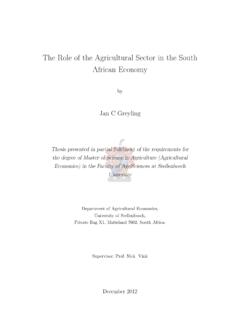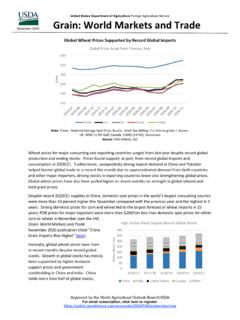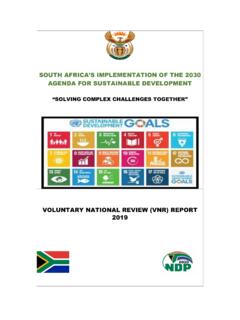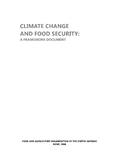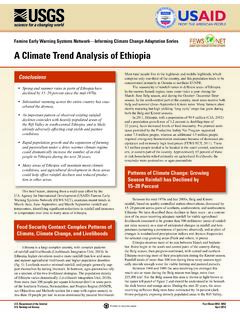Transcription of The Current State of Fruit & Vegetable Agro-Processing in ...
1 The Current State of Fruit &. Vegetable Agro-Processing in South Africa Commissioned by the Netherlands Enterprise Agency The Current State of Fruit & Vegetable Agro-Processing in South Africa Challenges and Opportunities Authors: Micha van Lin ITP Advisory Services Aart van den Bos Verbos Business Development Nazeem Sterras WCFFI / Food SA. Final report - 26 November 2018. Table of Contents Summary .. 3. Foreword .. 5. 1. 7. Objectives and Scope .. 7. Approach and 9. Guidelines for the Reader .. 11. 2. General overview of Agro-Processing in South Africa.
2 12. Government Policies & Priorities Relating to the Agro-Processing Industry .. 12. Overview of the South African Fruit and Vegetable Value Chain .. 15. The (International) Market for SA Fruit and 17. Processing Fruit And Vegetables A Concentrated 19. 21. 3. Insights into selected value chains .. 23. Juices .. 23. Sauces, Dressings and Condiments .. 27. Dried Fruits .. 30. Nuts .. 34. Indigenous and Niche 39. 4. Challenges in Processing Fruit and Vegetables .. 43. Factors Influencing (SMME) Growth in Fruit and Vegetables 43. Common Challenges in the Fruit and Vegetable 43.
3 Access to Markets South African 45. Access to International 49. Challenges for Agro-Processing Companies .. 50. Summary Gap 53. 5. Trends and Technological Developments .. 55. Trends in Europe and The 55. Trends in Fruit and Vegetable Processing .. 57. Trends in Waste Reduction and Food 60. Trends in Preservation and Extending Shelf 61. Trends in Sustainable Packaging .. 62. Trends in Transparency and Traceability .. 64. Trends in Consumer Snacks and Nuts .. 65. 6. Conclusions and Recommendations .. 67. 1. Annex 1. Reference List .. 73. Annex 2. People involved / interviewed.
4 76. This report has been prepared by: 2. Summary This scoping study provides an overview of the Current State of the Agro-Processing industry in South Africa, describes the Current challenges and identifies the extent to which the Agro-Processing industry can add value, with the aim of limiting imports. The study provides recommendations and identifies Dutch technologies and solutions which are applicable to the South African context. Food production is South Africa's largest manufacturing sector and is dominated by a few very large, diversified, national and multinational food manufacturers.
5 Although there are over 1800 food production companies, the top ten are responsible for 70% of the industry's turnover. Nonetheless, most of South African premium quality fresh fruits are exported at high prices and the remainder are sold on the local market. Fruit that is used in processing only accounts for an estimated 29% of total Fruit production. Therefore, Fruit processing is regarded as a residual' industry that processes fall out or downgraded' fruits from the fresh Fruit market. The Vegetable market is also focused on fresh produce, but is predominantly nationally oriented.
6 There are limited Vegetable processing activities taking place, although consumer trends show an increase in demand for sauces and condiments, and there is therefore potential for growth in this area. Growth in the Agro-Processing industry tends to be limited because it requires high capital investment, and scale is needed to compete with the world market. Finding qualified personnel with the right skillset and experience is a common challenge in South Africa, and although Agro-Processing provides potential for employment creation, companies are faced with the high cost of finding, training and retaining suitable staff.
7 The export of processed and fresh goods are limited by high transportation costs and a lack of market access due to insufficient export protocols with some markets. Throughout the study, Access to Markets; Access to Processing Technology; Access to Finance; Access to Skills & Information; and Access to Inputs were consistently identified as the most important factors influencing growth in the South African Agro-Processing industry. Key challenges of the industry include the lack of year-round availability of input produce; water-scarcity; lack of appropriate agro - processing technologies; transparency/traceability; and a general lack of access to information and skills.
8 The Netherlands has much to offer in terms of Fruit and Vegetable processing, for instance in waste reduction and food loss; preservation and extending shelf life; and increasing transparency and traceability. Technologies from The Netherlands are already widely used in the South African agro - processing industry. However, new linkages between Dutch solutions and South African challenges can 3. be made, although solutions need to be adapted to the South African context. Typically, The Netherlands is strong in high quality, high volume solutions, and although the South African market has a need for high quality standards, the Agro-Processing industry caters for lower volumes.
9 Specific Dutch technologies could be applied in the smart usage of crop varieties; reduction of postharvest losses; cold chain logistics; more efficient production and distribution processes; optimal water usage in production and processing (re-use of waste water and less consumption); optimal usage of residual flows; and in the reduction of and innovations in packaging. 4. Foreword Dutch farming, horticulture and fisheries are continually innovating, making The Netherlands a global leader in these sectors. Dutch agriculture remains successful by continually investing in sustainable development and the renewal of agricultural production chains, where farmers are full partners in the agricultural production chains.
10 The Netherlands promotes and supports technologies and innovations that support circular principles (for example use of robotics, sensor technology, precision agriculture, waste reduction & bringing waste to value). The Netherlands is a reliable, innovative and solution-driven partner in the AGRI sector. To truly understand the unique South African context and achieve real results in the area of agriculture we actively engage with South African stakeholders. Through these Dutch - South African cooperations in the agricultural sector we co-create ideas and innovations for a sustainable future in South Africa and the Netherlands.
